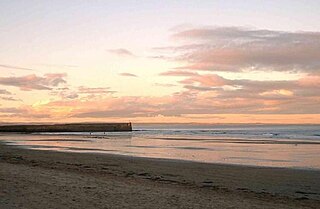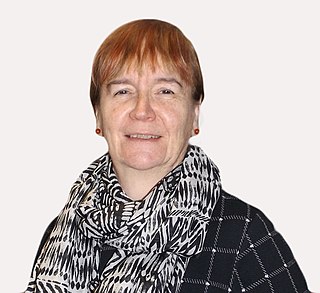Related Research Articles
Aubrey William George Manning, OBE, FRSE, FRSB, was an English zoologist and broadcaster.

The Gatty Marine Laboratory is a science facility located in the coastal town of St Andrews in Fife, Scotland. It is part of the University of St Andrews and home to the Scottish Oceans Institute, an interdisciplinary research institute studying the marine environment, specifically the behaviour, ecology, physiology, population biology and functional genomics of marine organisms. The Gatty Marine Laboratory is known as the place where Richard G. Morris developed the Morris water navigation task in the early 1980s.
Anne Elizabeth Magurran is a British Professor of ecology at University of St Andrews in Scotland. She is the author of several books on measuring biological diversity, and the importance for quantifying biodiversity for conservation. She has won numerous awards and honors, is regularly consulted for global assessments and analyses of biodiversity and conservation and her research is often highlighted by journalists.

James Couper Brash, MC, FRCSE, FRSE was a leading anatomist and embryologist in Britain.
James Norman Davidson CBE PRSE FRS was a British biochemist, pioneer molecular biologist and textbook author. The Davidson Building at the University of Glasgow is named for him.
Thomas Jones Mackie CBE FRSE LLD was a noted Scottish bacteriologist; Dean of the Faculty of Medicine, University of Edinburgh; and author of medical research textbooks.

Sir Ian David Diamond is a British statistician, academic, and administrator, who served as Principal and Vice-Chancellor of the University of Aberdeen until 2018. He became the UK's National Statistician in October 2019.

John Gray McKendrick FRS FRSE FRCPE LLD was a distinguished Scottish physiologist. He was born and studied in Aberdeen, Scotland, and served as Regius Professor of Physiology at the University of Glasgow from 1876 to 1906. He was co-founder of the Physiological Society.
Dr William Elgin Swinton FRSE FLS, was a Scottish paleontologist.
Felicity Anne Huntingford FRSE is an aquatic ecologist known for her work in fish behaviour.
David Andrew Whiten, known as Andrew Whiten is a British zoologist and psychologist, Professor of Evolutionary and Developmental Psychology, and Professor Wardlaw Emeritus at University of St Andrews in Scotland. He is known for his research in social cognition, specifically on social learning, tradition and the evolution of culture, social Machiavellian intelligence, autism and imitation, as well as the behavioral ecology of sociality. In 1996, Whiten and his colleagues invented an artificial fruit that allowed to study learning in apes and humans.
Thomas N. Sherratt, known as Tom, is a professor of evolutionary ecology at Carleton University, Canada. He is known for his research on camouflage, aposematism and mimicry.
Martin Stevens is a British sensory and evolutionary ecologist, known for his work on animal camouflage, especially disruptive coloration.

Ethel Marian Scott, is a Scottish statistician, author and academic, specialising in environmental statistics and statistical modelling. She is Professor of Environmental Statistics at the University of Glasgow. She is additionally Vice-President (International) of the Royal Society of Edinburgh, and a member of the Scottish Science Advisory Council.
Patricia Monaghan is Regius Professor of Zoology in the Institute of biodiversity, animal health & comparative medicine at the University of Glasgow.
Sarah Wanless is an animal ecologist in the UK and is an expert on seabirds; she is a Fellow of the Royal Society of Edinburgh and is Honorary Professor at the Universities of Glasgow and Aberdeen.
Jane Reid is an evolutionary ecologist from the UK, she is International Chair Professor at the Norwegian University of Science and Technology (NTNU) in Trondheim, Norway and is also Professor of Population & Evolutionary Ecology at the University of Aberdeen.
Susan Denise Healy FRSE professor of biology at the University of St. Andrews, specialist in cognitive evolution and behavioural studies of birds and understanding the neurological basis of this. She was elected as a Fellow of the Royal Society of Edinburgh in 2021.
Maria Dornelas FRSE is a researcher in biodiversity and professor of biology based at St. Andrew's University. She was made a Fellow of the Royal Society of Edinburgh in 2021. Her research into biodiversity change has challenged previous views, on the growth and decline of coral reefs to understanding global biodiversity with data analysis on how species or ecosystems are changing in the Anthropocene.
Heather Margaret Ferguson FRSE, Professor of Medical Entomology and Disease Ecology, at Glasgow University; a specialist in researching mosquito vectors that spread malaria, in global regions where this is endemic, aiming to manage and control a disease which the World Health Organization estimates killed over 400,000 people in 2020. Ferguson co-chairs the WHO Vector Control Advisory Group and was elected as a Fellow of the Royal Society of Edinburgh in 2021.
References
- ↑ Lee, Jane J. (9 February 2012). "Mystery of Zebra's Stripes Finally Solved?". ScienceNOW. Archived from the original on 16 January 2013. Retrieved 15 February 2013.
- ↑ "Prof Graeme Ruxton". University of St Andrews School of Biology. Retrieved 30 December 2013.
- ↑ "Professor Graeme Ruxton". University of Glasgow Institute of Biodiversity, Animal Health and Comparative Medicine. Retrieved 30 December 2013.
- ↑ "author:graeme author:ruxton". Google Scholar. Retrieved 12 January 2018.
- ↑ "Professor Graeme Douglas Ruxton FRSE - The Royal Society of Edinburgh". The Royal Society of Edinburgh. Retrieved 2018-06-26.